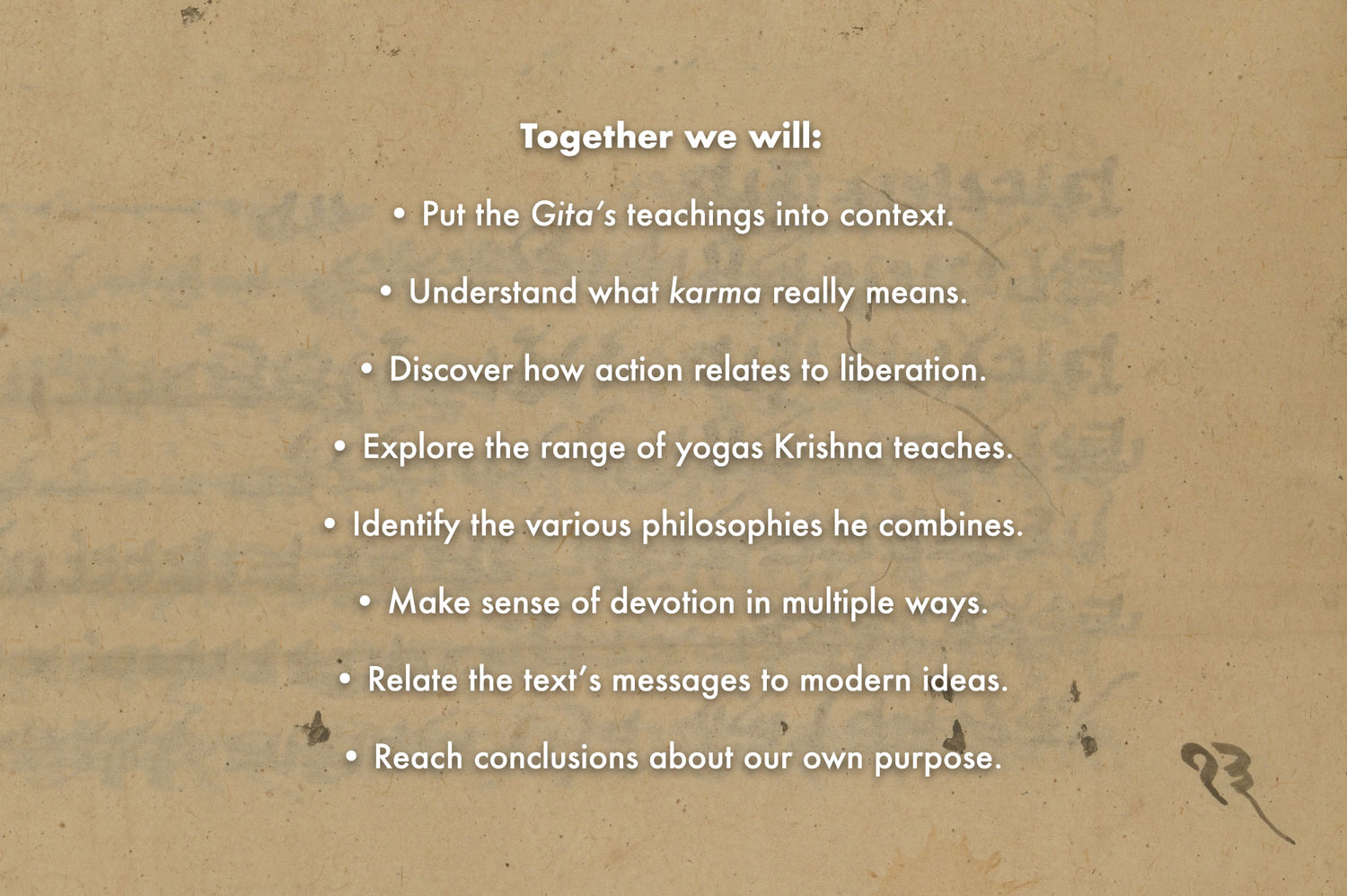 Image 1 of
Image 1 of


Yoga Book Club: Bhagavad Gita
Sundays, March 17 - April 7
5:00 PM (UK); 12:00 PM (ET); 9:00 AM (PT)
Sundays, March 17 - April 7
5:00 PM (UK); 12:00 PM (ET); 9:00 AM (PT)
Sundays, March 17 - April 7
5:00 PM (UK); 12:00 PM (ET); 9:00 AM (PT)
Finding our way with the Bhagavad Gita
An online study group with Daniel Simpson
Sundays, Mar 17 - Apr 7, 2019
5:00 - 6:15 PM (UK)

Many versions, one text…
How do we find peace in the midst of life’s challenges? Does yoga detach us or help us to act? What is our purpose? These timeless questions are the heart of the story in the Bhagavad Gita. It can be read in an evening and shape a whole lifetime.
Exploring it together, we’ll find our own ways to relate to its insights. Over four weekly sessions of 75 minutes, we’ll look in depth at the Gita’s ideas, from its teachings on yoga to moral dilemmas and ways to interpret them.
There are many different English editions. It’s fine to pick whichever one appeals. We’ll read verses aloud to compare how they vary. If you’d like to see the Sanskrit translated word-by-word, Winthrop Sargeant’s book is recommended.
To prepare for each session, we’ll read a few chapters in advance. A handout will be sent by email, providing guidance on themes to consider, and drawing attention to significant passages. This will also give us some structure for our discussions. However, everyone is free to contribute as they wish.
Format
We meet each Sunday for a live interactive video session on Zoom. All you need is a stable connection and a browser (or Zoom has a mobile and desktop app).
There will be ample time for questions, and each session will be shaped by participants. You can also ask follow-up questions by email, or in a private Facebook group.
If you can't join us live, you can access a recording. We start at 5:00 PM, UK time, which is 12:00 PM in New York and 9:00 AM in California.
N.B. thanks to the difference in daylight saving - which starts in Europe on March 31, but in the U.S. on March 10 - the first two sessions will be one hour later for Americans, i.e. 1:00 PM (ET) and 10:00 AM (PT). You’ll get an email reminder before each meeting.

Week 1 - ACTION (March 17)
Reading: Chapters 1-3
An introduction to the text, and its historical context. This helps to explain one of its main innovations: making yoga compatible with action. Originally, yogis renounced worldly life to escape rebirth. They retreated to forests to do as little as possible, rejecting the dominant social order. The Gita finds ways to make yogic practice less extreme, bringing its ideas into mainstream culture. This is explained through a soldier’s dilemma on the battlefield. He refuses to act, because doing his duty means killing his relatives. His perspective is gradually changed by yogic teachings.
Week 2 - KNOWLEDGE (March 24)
Reading: Chapters 4-6
The Gita is a dialogue between the warrior Arjuna and his chariot driver Krishna, who teaches him yoga. This takes many different forms, none of them resembling today’s postural practices. However, there are insights from various traditions of yogic philosophy, drawing on the early Upanishads, the Samkhya theory behind the Yoga Sutra, and aspects of Buddhism. Krishna also gives practical guidelines for meditation, which he presents as a way to make action wise, as well as attaining liberating knowledge.
Week 3 - DEVOTION (March 31)
Reading: Chapters 7-12
Krishna is a manifestation of the Supreme Being, and the title of the Bhagavad Gita means “God’s song.” After teaching Arjuna several yogic methods, Krishna repeatedly says devotion is the best. However, he also explains who he is in different ways. This allows for a range of religious perspectives, from the worship of a separate god to non-dual awareness. He eventually blows Arjuna’s mind with a trippy revelation of himself as everything. Krishna says it is liberating to see beyond the limits of a personal worldview, and to absorb oneself with love in something bigger.
Week 4 - LIBERATION (April 7)
Reading: Chapters 13-18
The closing section of the Gita builds to conclusions about life’s meaning and ultimate purpose. Each of us has our own role, Krishna says. We just have to find what it is, and carry it out as best we can. Some aspects of this are pre-programmed by nature and nurture, but we choose our response. After listening to Krishna, Arjuna has to decide if he will go into battle, aware that the outcome is out of his hands. His search for clarity in turbulent times seems as relevant now as when the text was composed. How might we act based on what we have read?
About the Facilitator

Daniel Simpson presents ancient texts for modern times.
He teaches courses on yoga philosophy at the Oxford Centre for Hindu Studies, at Triyoga in London, and on teacher trainings.
He holds a Master’s degree from SOAS, University of London, where he studied with some of the world’s leading scholars of yoga.
He is also a devoted practitioner, having first encountered yoga in India in the 1990s. His practical guidebook to yoga philosophy is forthcoming.
Endorsements
Student feedback from previous courses.
“Adeptly blends academic rigor, insight and humor.”
“Incredibly accessible and easy to absorb.”
“This was a great experience. I learned so much.”